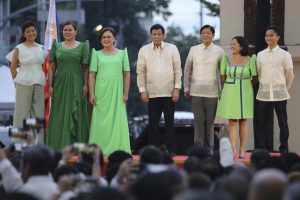The clamor against the power of political clans in the Philippines has been revived, after the Supreme Court uploaded a copy of the petition seeking an order to compel Congress to pass a law banning political dynasties.
Under the 1987 Constitution, political dynasties are prohibited, but there is a need for an enabling law to enforce this. According to the Constitution, “The State shall guarantee equal access to opportunities for public service, and prohibit political dynasties as may be defined by law.”
But Congress has failed to pass such a law over the past 37 years. This is not a surprise since both the House of Representatives and the Senate are dominated by political dynasties. It is almost impossible to convince legislators to pass a law that will make many of them ineligible to run for public office.
A 2012 study published in the Philippine Political Science Journal showed that an average of 31.3 percent of all congressmen and 23.1 percent of governors were replaced by relatives between 1995 to 2007. A 2019 study by the Ateneo de Manila University’s School of Government found that 80 percent of governors, 67 percent of House representatives, and 53 percent of mayors came from political dynasties.
The country’s president, Ferdinand “Bongbong” Marcos Jr., is part of a political dynasty. His sister is a senator, his son is a congressman, his cousin is Speaker of the House, and he has elected relatives in Ilocos Norte and Tacloban City. The country’s vice president, Sara Duterte, is also a member of a political dynasty. Her brothers are the mayor and congressman of Davao City. Her father, former President Rodrigo Duterte, is reported to be running for the Senate in 2025.
Political dynasties are blamed for the country’s continued underdevelopment. The Philippine Star recently highlighted the pernicious impact of dynasties on the country’s politics. “Many clans have a stranglehold on nearly all the government resources for dispensing dole-outs and carrying out tax-funded projects in their fiefdoms, leaving little room for outsiders to challenge their political control,” it said in an editorial.
It also pointed out the link between political dynasties and impunity: “Dynasty building undermines the criminal justice system, with clans controlling the police, prosecution, judiciary and jail facilities in their turfs. This has engendered impunity, as the nation has seen in so many brazen political killings.”
Former Senator Leila de Lima, who belongs to the Liberal Party, underscored the need to modernize politics. “Modernization demands that politics should be based on a strong multi-party system and genuine governance platforms, not on feudal and cultural patronage remnants of the past that are the cause of all our backwardness as a society,” she wrote on her X (Twitter) account.
Neophyte Senator Robin Padilla, who has endorsed the senatorial bids of three members of the Duterte family, responded to the court petition by filing a bill banning political dynasties. “It is time to break the barriers preventing the best and the brightest from serving the Filipino people,” he said in a statement. He accused dynasties of exhausting resources “to attain economic and political dominance while at the same time compromising political competition and undermining accountability.”
Under the bill, “No spouse or person related within the fourth degree of consanguinity or affinity, whether legitimate or illegitimate, full or half blood, to an incumbent elective official seeking re-election, shall be allowed to hold or run for any elective office in the same city and/or province, or any party list in the same election.”
Senator Grace Poe filed a similar bill in August 2022 but it has yet to be deliberated by the chamber. A youth legislator also has a pending bill in the House of Representatives. Unless the Supreme Court acts in favor of the petition, it is highly unlikely that Congress will pass a law against political dynasties.
But former Senator Francisco Tatad, believes that the Supreme Court “should have focused more on the political excesses and abuses associated with them.” He also thinks that electoral reforms are more effective. “We should impose the toughest penalties for electoral offenses, and those found guilty of any of them should be permanently barred from public office,” he wrote in his column.
In the meantime, Philippine politics remains largely under the sway of political dynasties who are already maneuvering for power and influence ahead of the midterm election next year.

































